Discover the untold stories of Mary's parents, Joachim and Anne, and how their faith set the stage for a biblical legacy.

Mary's Parents in the Bible
You've heard of Mary, the mother of Jesus, but what about her parents, Joachim and Anne? While the Bible doesn't detail their lives, traditions outside the canonical texts fill in the gaps, offering a rich tapestry of faith and perseverance.
The Protoevangelium of James, a text from the second century, introduces us to Mary's lineage, shedding light on her origins and the values that shaped her. This background not only deepens our understanding of Mary's character but also highlights the significance of her upbringing in the broader biblical narrative.
Let's explore the stories of Joachim and Anne, and consider how their lives might inspire our own faith journeys.
Key Takeaways
- Joachim and Anne, devout descendants of King David, are recognized as Mary's parents in Christian tradition.
- Their piety and promise to dedicate Mary to God highlight their righteousness.
- Mary's upbringing by Joachim and Anne was deeply rooted in faith, preparing her for her future role.
- The lineage from David through Mary to Jesus underscores the fulfillment of divine promises and Jesus' royal heritage.
The Protoevangelium of James
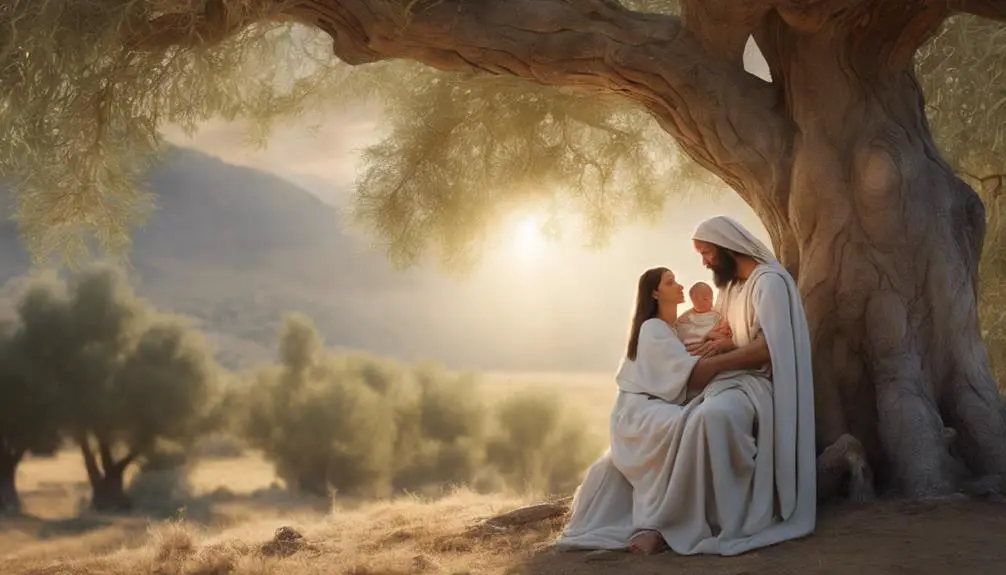
The Protoevangelium of James, an apocryphal text from the second century, provides a detailed account of Mary's parentage and early life, offering insights that are absent from the canonical gospels. You'll find that its apocryphal origins have sparked significant debate among scholars regarding its textual authenticity. Unlike the canonical texts recognized by mainstream Christian traditions, the Protoevangelium doesn't enjoy the same level of acceptance. However, its detailed narration fills in the gaps left by the canonical gospels concerning Mary's early life, providing a rich tapestry of traditions that have influenced Christian thought and art.
Analyzing its textual authenticity involves scrutinizing the historical context in which it was written and the literary style it employs. The Protoevangelium, written in the style of a gospel, claims to offer firsthand insights into events not covered in the New Testament. However, its second-century origin, well after the events it describes, raises questions about its factual accuracy. Scholars argue that while it may not provide a historically accurate account, it reflects the early Christian community's attempts to understand and venerate Mary's life and family background. Thus, its value lies not in its historical veracity but in its contribution to the development of Christian doctrine and Mary's veneration.
Joachim and Anne's Story
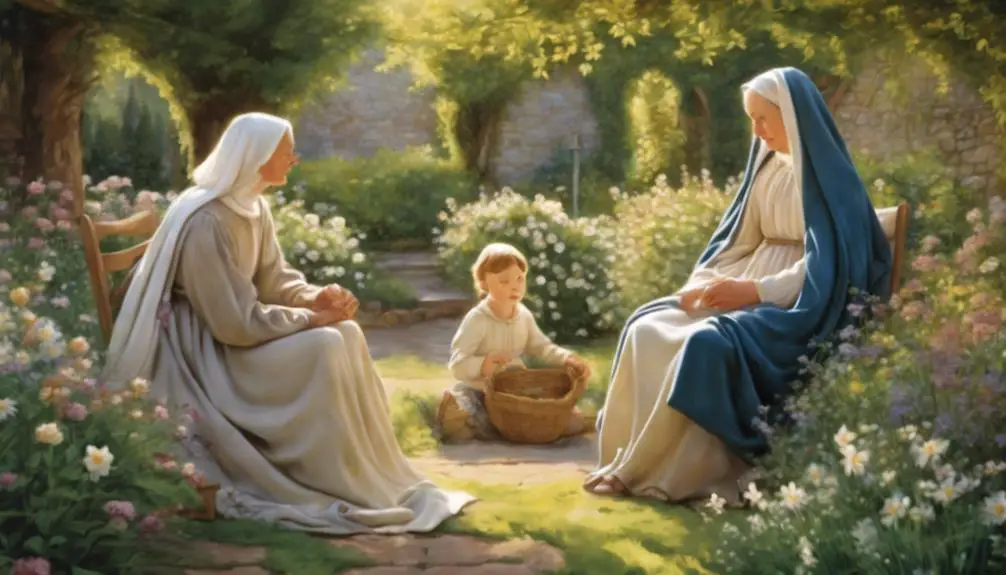
Delving into Joachim and Anne's story, you'll uncover a narrative deeply entrenched in early Christian traditions, revealing the origins of Mary's parents as depicted in the Protoevangelium of James. This text, while not included in the canonical Bible, provides a rich tapestry of detail that has shaped the understanding and saintly veneration of Joachim and Anne through centuries.
- Emotional Resonance: Their story, marked by longing and divine intervention, tugs at the heartstrings, portraying them as enduring symbols of faith and patience.
- Cultural Impact: The narrative has significantly influenced Christian iconography and liturgy, embedding Joachim and Anne deeply in the religious psyche.
- Apocryphal Origins: Despite its apocryphal status, the story lends a profound layer of depth to the lineage and life of the Virgin Mary, enriching the tapestry of Christian narrative.
- Saintly Veneration: Their veneration across various Christian denominations underscores the universal appeal and inspirational qualities of their story, transcending the boundaries of scripture to touch the faithful.
Analyzing their narrative not only provides insights into the cultural and religious context of their times but also underscores the enduring power of their story in shaping the devotion and understanding of Mary's lineage.
The Significance of Mary's Lineage
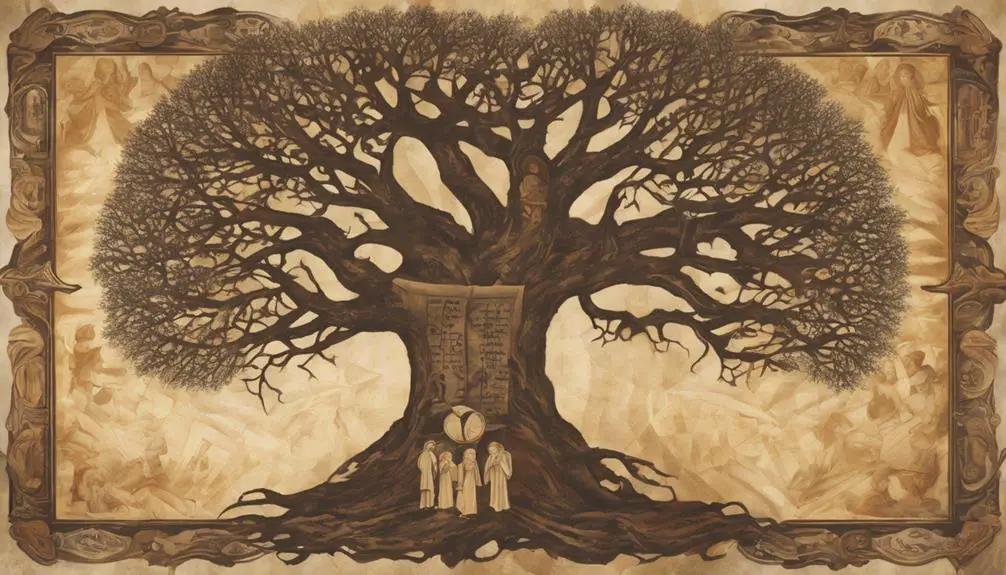
Understanding Mary's lineage illuminates not only her pivotal role in Christian theology but also underscores the profound interconnectedness of biblical narratives and their implications for faith. Delving into Mary's ancestral roots, particularly her Davidic descent, reveals how genealogical prophecies from the Old Testament find fulfillment in the New Testament, specifically through her role as the mother of Jesus Christ.
Aspect |
Significance |
Biblical Connection |
|---|---|---|
Davidic Descent |
Establishes Jesus' royal lineage and right to the throne of David. |
Linked to prophecies in Samuel and Psalms. |
Genealogical Prophecies |
Foretells the messiah's lineage, emphasizing the fulfillment of divine promises. |
Highlighted in Isaiah and Jeremiah. |
Interconnectedness |
Demonstrates the continuity and unity of biblical narratives, bridging the Old and New Testaments. |
Illustrated through Matthew and Luke's genealogies. |
This table brings into focus the deep layers of significance behind Mary's heritage. It's not just her biological lineage that matters but the symbolic and prophetic roles it signifies. Mary's descent from David doesn't merely serve as a historical or genealogical note; it's a testament to the meticulous unfolding of God's plan for humanity, as foretold through genealogical prophecies. Her role, therefore, is not incidental but central to the Christian understanding of redemption and salvation.
Traditions and Devotions
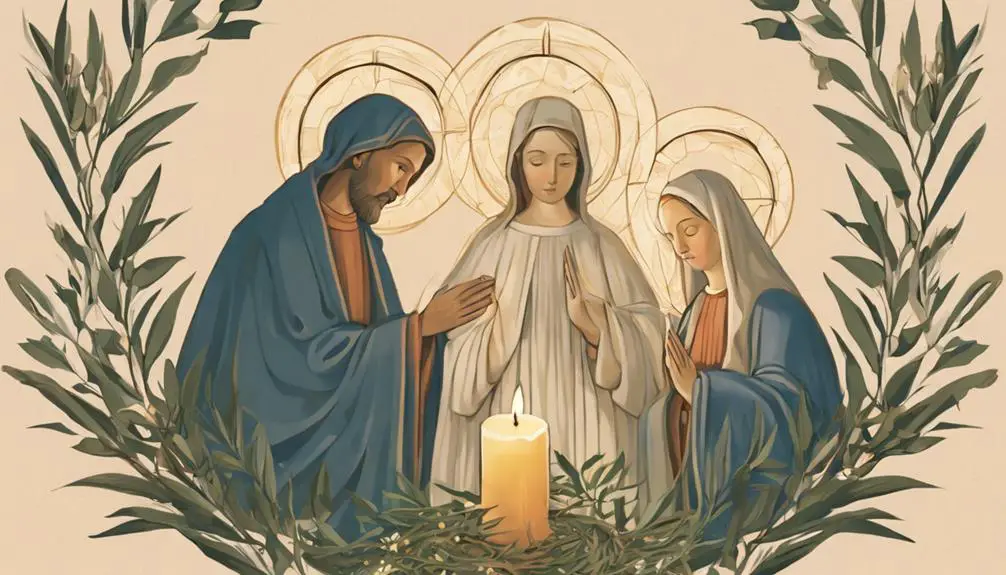
Across centuries, numerous traditions and devotions have evolved to honor Mary, reflecting her central role in Christian spirituality and theology. These practices not only commemorate her life and virtues but also serve as a bridge connecting the faithful to the divine. Within this rich tapestry of veneration, certain elements stand out, deeply embedded in the fabric of Christian culture:
- Marian Feast Days: Central to these traditions are the Marian feast days, which punctuate the liturgical calendar. These days aren't mere markers of time but evoke deep emotional resonance among the faithful, celebrating key moments in Mary's life and her role as the mother of Jesus.
- The Rosary: A meditative practice that combines prayer and reflection on the life of Mary and Jesus. It's a spiritual journey, inviting participants to contemplate the mysteries of faith through Mary's eyes.
- Marian Pilgrimages: Journeys to sacred sites associated with Mary, such as Lourdes or Fatima. These pilgrimages are acts of devotion and seeking, where the physical act of traveling mirrors the spiritual journey towards God, guided by Mary.
- Iconography and Art: Through centuries, artists have depicted Mary, capturing her essence and role. This visual veneration not only adorns churches but also serves as a focal point for personal and communal prayer, inspiring and deepening the faith of believers.
These veneration practices and the celebration of Marian feast days exemplify the profound impact of Mary's figure in Christian devotion, offering a multifaceted approach to understanding and expressing faith.
Mary's Upbringing and Influence
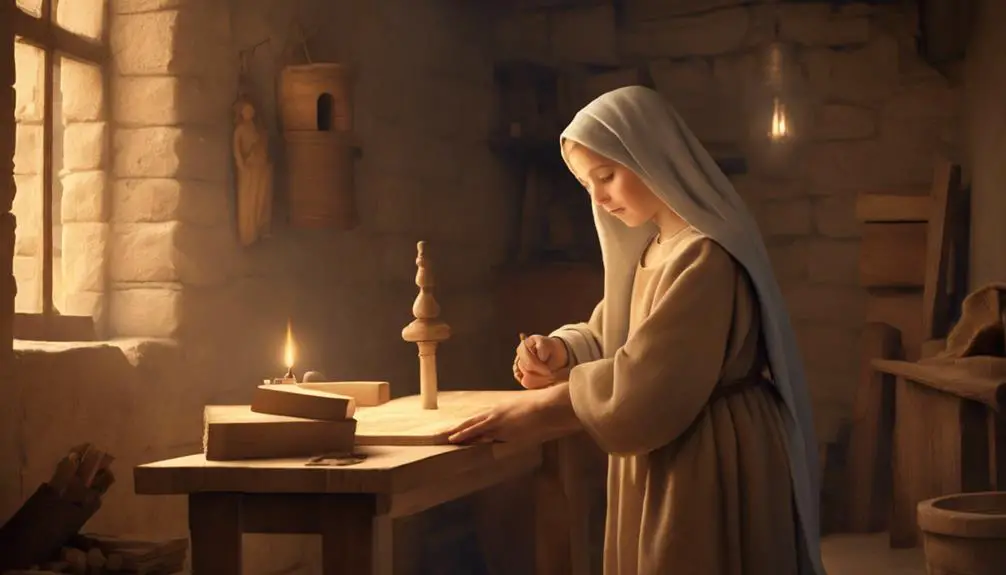
Reflecting on Mary's upbringing, it's crucial to consider the cultural and religious contexts that shaped her character and, subsequently, her profound influence on Christianity. You're diving into an era where cultural context wasn't just a backdrop but a pivotal force in shaping individuals' identities and destinies. Mary's life, deeply rooted in Jewish religious practices, offers a fascinating glimpse into the world that prepared her for her unique role.
The religious practices of the time weren't merely rituals but a way of life that fostered a deep, personal connection with God. This connection is crucial in understanding Mary's unwavering faith and obedience, characteristics that defined her life and mission. Her environment was imbued with stories of faith, prophecies about the Messiah, and a longing for redemption, which undoubtedly influenced her spirituality and perception of her role in God's plan.
Moreover, the cultural context provided a framework for Mary's actions and decisions. It was within this framework that she navigated her extraordinary calling with humility and courage. Her upbringing, steeped in a tradition of faithfulness and devotion, prepared her to embrace her destiny, making her an enduring symbol of faith and obedience in Christianity.
Frequently Asked Questions
How Do Modern Historical and Archaeological Findings Align With the Traditional Accounts of Mary's Parents?
Modern historical and archaeological findings offer a nuanced view on genealogical accuracy and cultural context relating to ancient figures. While they don't directly confirm traditional accounts of specific individuals, they provide valuable insights into the era's societal norms and family structures.
This background helps you understand the complexities surrounding historical narratives, encouraging a more informed analysis of traditional stories, including those about figures like Mary's parents, within their historical and cultural settings.
Are There Any Non-Christian Texts or Traditions That Mention Mary's Parents, and How Do They Compare to Christian Narratives?
If you're diving into ancient texts like an archaeologist unearthing hidden treasures, you'll find that Islamic references and Apocryphal stories offer intriguing insights.
Unlike the Christian narratives, these sources weave a tapestry of tales about Mary's lineage.
For instance, the Quran mentions Mary's family, albeit with differences in detail and emphasis compared to Christian texts.
This cross-cultural comparison enriches our understanding, painting a more nuanced picture of historical religious figures.
How Have Perceptions of Mary's Parents Evolved in Different Christian Denominations Over the Centuries?
You've seen perceptions of Mary's parents shift across Christian denominations over centuries, delving into genealogical mysteries and fluctuating levels of parental veneration. These evolutions reflect theological debates, cultural influences, and scriptural interpretations.
Some traditions emphasize their holiness and role in salvation history, while others maintain a more subdued reverence. Analyzing these changes offers insights into how religious narratives adapt, highlighting the complex relationship between tradition, scripture, and faith interpretation.
What Role Do Mary's Parents Play in Contemporary Religious Practices and Beliefs Outside of Traditional Devotions?
You might think parental influence and cultural celebrations have little in common, but they're deeply intertwined in contemporary religious practices. Beyond traditional devotions, the legacy of figures akin to Mary's parents enriches community events and personal faith expressions.
Their stories inspire rituals and morals, embedding into cultural celebrations and daily practices. This integration demonstrates how foundational narratives shape not just beliefs but also how communities come together to honor their spiritual heritage.
How Do Feminist Theological Interpretations View the Portrayal and Significance of Mary's Parents in the Bible and Christian Tradition?
You'll find that feminist theological interpretations scrutinize the portrayal and significance of these figures critically. They delve into gender dynamics, highlighting how scriptural interpretations have historically marginalized women's roles.
This perspective seeks to uncover and challenge the underlying assumptions within Christian tradition, advocating for a more inclusive understanding of gender and leadership. Through this lens, every narrative, including those less emphasized, gains depth, offering a richer, more equitable spiritual landscape.
Conclusion
In conclusion, the narrative of Joachim and Anne, as found in the Protoevangelium of James, isn't just a story; it's a celestial blueprint that underscores the monumental importance of Mary's lineage.
This meticulously detailed account enriches our understanding of Mary's upbringing, casting a divine light on her pivotal role in salvation history.
Through traditions and devotions, the faithful are invited to delve deeper into the profound influence of Mary's heritage, which, in essence, is the bedrock upon which Christianity stands.



Sign up